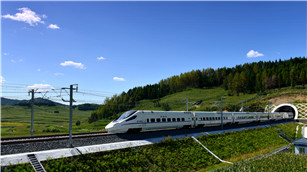'Small giants' do heavy lifting for industrial base
By He Na and Han Junhong ( China Daily )
2014-11-07
China's northeast caught the central government's attention after reporting weak growth in the first half of this year.
According to the National Bureau of Statistics, Jilin and Liaoning provinces were two of the five provincial-level regions where first-half economic expansion was slower than in the first quarter, suggesting decelerating growth.
Among the 31 provinces, municipalities and autonomous regions on the mainland, Jilin ranked 28th. For the first half of this year, its GDP growth was 6.8 percent, 2.2 percentage points lower than in the same period of 2013 and the slowest pace in the past three years. It set a growth target of 8 percent at the beginning of this year.
Heavy reliance on the vehicle and railway industries has curtailed the city's ability to respond to market changes and held back its economic development. But booming private high-tech enterprises will help the city adjust its economic structure and make the city's economy more risk-resistant, Fu said.
Data from the Jilin Bureau of Statistics show the first-half production of the vehicle industry in Changchun was more than 300 billion yuan, which helped boost the city's industrial output growth to 9.4 percent.
The contribution to industrial growth by the transport industry was 93.3 percent, with FAW Group and CNR Changchun Railway, the two largest enterprises in the city, contributing the majority.
But "the small giants" have maintained double-digit growth in recent years and become a new engine of the city's economic growth.
"We have established a special fund to encourage corporate innovation," said Sun Guoqing, director of the Changchun Bureau of Science and Technology.
And under tax breaks introduced in 2013, business tax only kicks in when monthly sales reach 20,000 yuan.
"We have established a financing guarantee fund in cooperation with banks, enterprises and escrow companies to relieve these enterprises' fund shortages," Sun said.
"More preferential policies will be launched next year, including the establishment of innovation platforms to develop ties among enterprises, universities, colleges and institutes," he said.
"By helping these enterprises, we can also help improve employment. If every enterprise can hire 20 university graduates each year, then thousands of high-tech jobs will be created," said Sun.
Wu is more interested in government support in establishing close ties with universities. Jilin Province King Laser often has universities carry out research projects on its behalf. Meanwhile, the company provides internships and other aid for students that universities cannot offer.
"Many of our research staff come from universities and they are the company's most precious assets. They have helped us to keep coming out with innovative ideas," he added.




